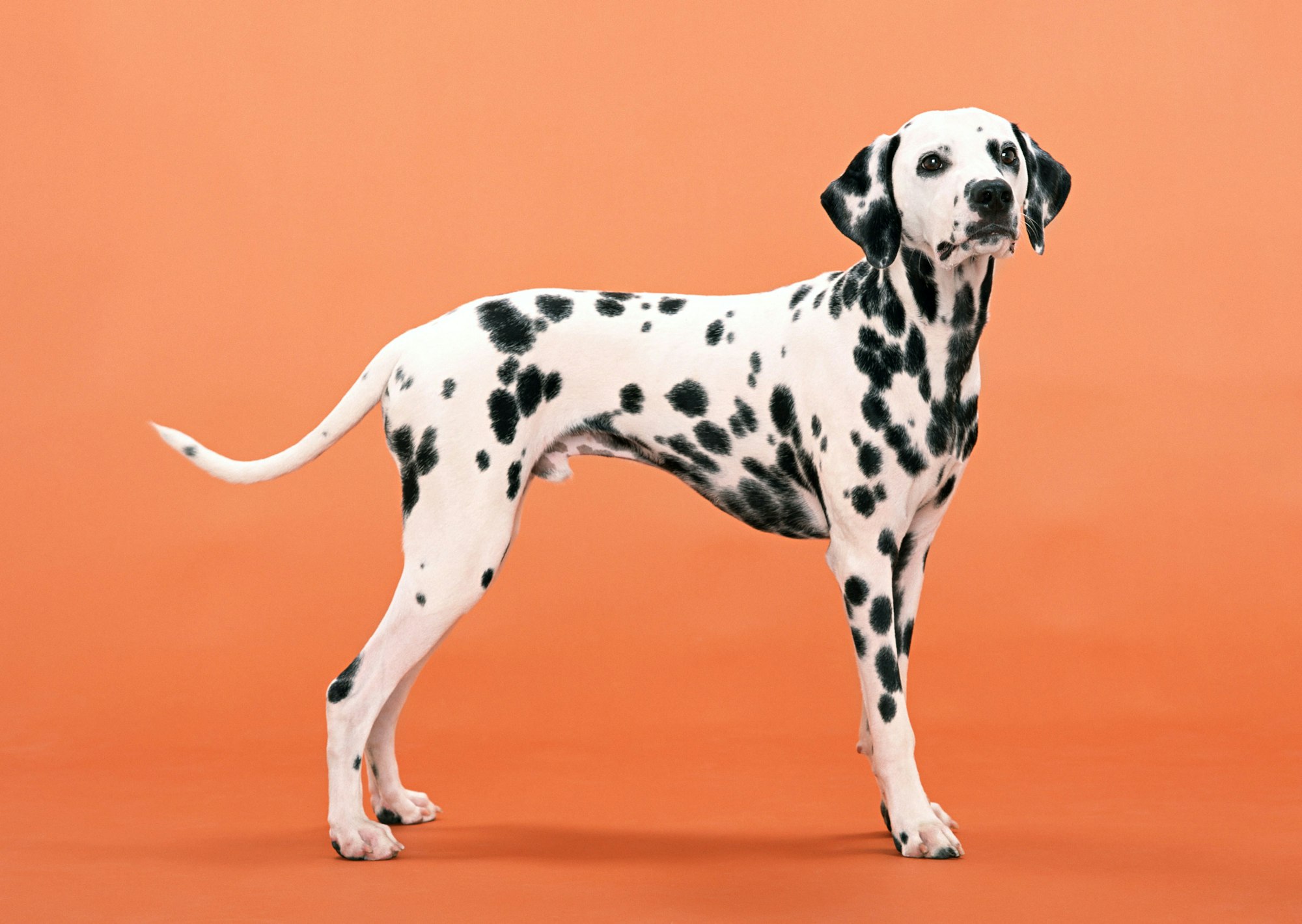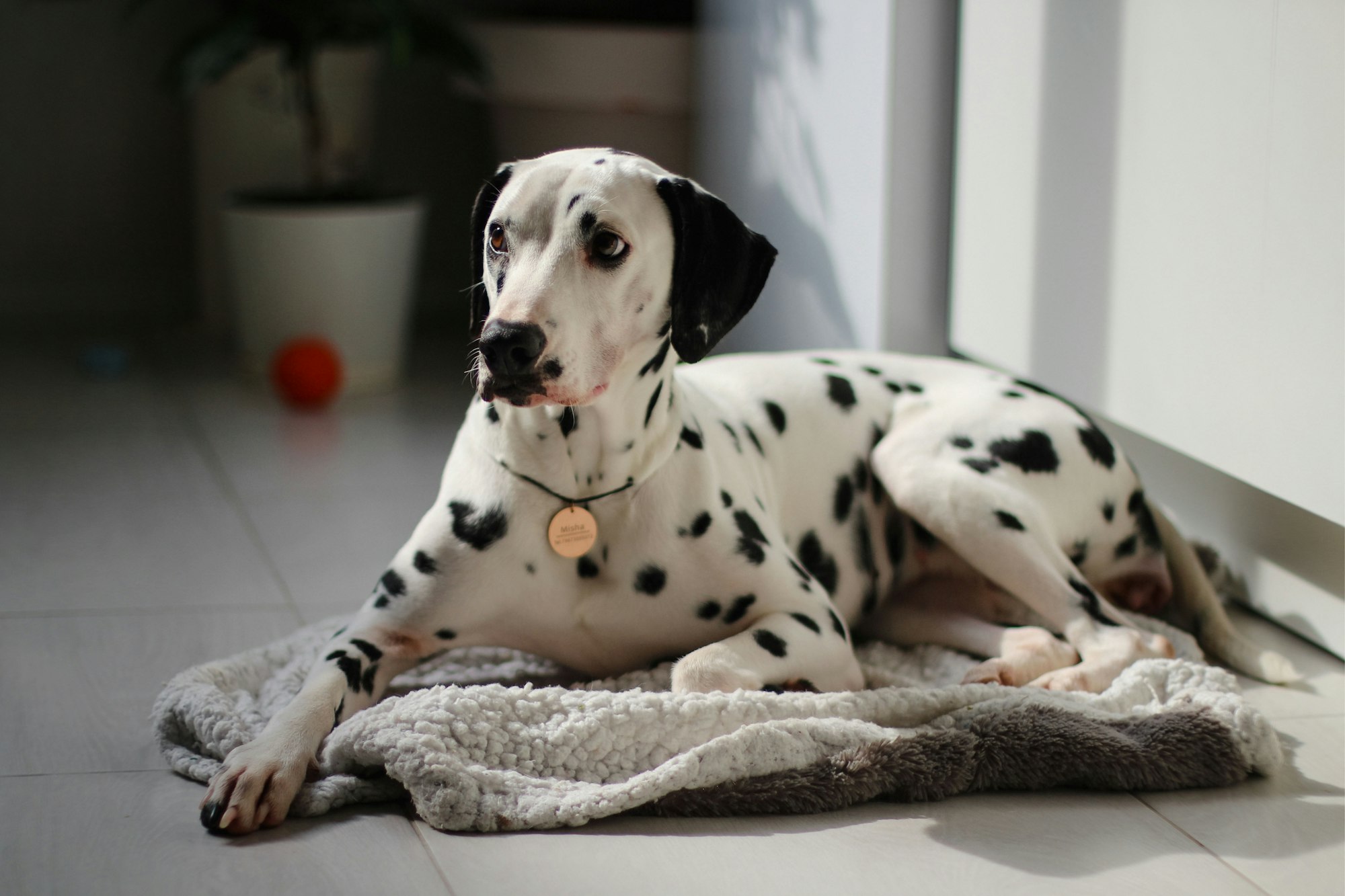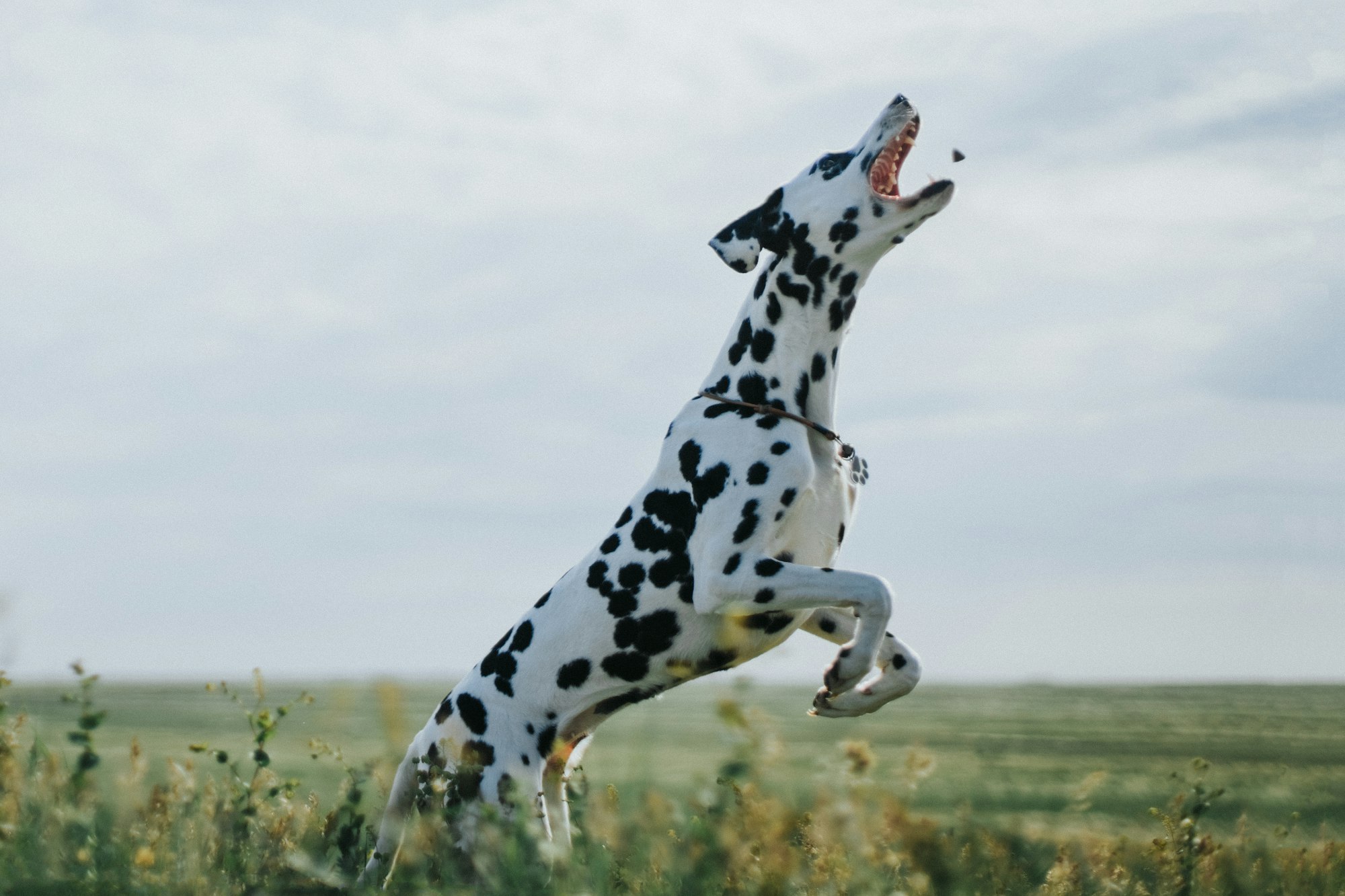Dalmatians, with their distinctive spotted coats and captivating charm, have captured the hearts of dog enthusiasts and moviegoers alike. From their historical roles as carriage dogs to their modern-day status as beloved family companions, Dalmatians have left an indelible mark on our culture and our hearts. In this comprehensive guide, we will delve into the world of Dalmatians, exploring their history, physical traits, personality, exercise needs, grooming requirements, training tips, health considerations, social interactions, and more.

Dalmatian Introduction
The Dalmatian's distinctive appearance and lively personality make it a standout breed that has captivated generations of dog lovers. Let's explore what makes Dalmatians truly special.
The Dalmatian's historical roles, including carriage dog and firehouse mascot, have contributed to its iconic status. Discover the rich history that has shaped this breed's unique characteristics.
Dalmatian Physical Characteristics: A Unique and Striking Appearance

Dalmatians are instantly recognizable due to their distinctive and eye-catching coat pattern. Beyond their spots, these dogs possess a sleek and athletic build that reflects their historical roles as carriage dogs and working companions. Let's delve into the captivating physical characteristics that define the Dalmatian breed:
- Coat: The Dalmatian's coat is short, dense, and sleek, providing a clean and polished appearance. The most iconic feature of their coat is the symmetrical black or liver spots that adorn a white background. Each Dalmatian's spot pattern is unique, making every dog truly one-of-a-kind.
- Color Variations: While black-spotted and liver-spotted are the most common coat colors, Dalmatians can also exhibit variations such as lemon (pale yellow) spots on a white coat. The spots are well-defined and evenly distributed over the body, creating a striking contrast.
- Elegantly Proportioned Body: Dalmatians boast a balanced and elegant body structure. They have a deep chest, well-sprung ribs, and a level back. The breed's athleticism is evident in their graceful yet powerful appearance.
- Distinctive Head: The head of a Dalmatian is refined and dignified, with a flat skull and a well-defined stop (the angle between the forehead and the muzzle). Their expressive eyes are medium-sized and come in shades of brown or blue, adding to their unique allure.
- Ears: Set high and carried close to the head, Dalmatians' ears are of moderate size and have a slightly rounded shape. Their alert and attentive expression is heightened by their ears' positioning.
- Tail: The tail of a Dalmatian is of moderate length and tapers to a slight point. It is carried with a slight upward curve and is never curled over the back. The tail complements the breed's overall balance and poise.
- Lively Gait: Dalmatians move with a free and effortless gait. Their powerful hindquarters and well-angled stifles contribute to their smooth and dynamic movement, which is a testament to their agility and athleticism.
- Size: Dalmatians are a medium-sized breed, with males typically being slightly larger than females. Their size, combined with their striking appearance, commands attention wherever they go.
Dalmatians' physical characteristics reflect a breed that is not only visually striking but also embodies a rich history of performance and companionship. Their athletic prowess and unique coat make them stand out in a crowd, while their graceful movement and expressive features capture the hearts of those fortunate enough to share their lives with these remarkable dogs.
Weight and Height of a Dalmatian
Dalmatians, with their sleek and athletic build, exude elegance and grace. Here's a closer look at the typical weight and height ranges for this distinctive breed:
Weight:
- Adult Male Dalmatians typically weigh between 55 to 70 pounds (25 to 32 kg).
- Adult Female Dalmatians generally weigh around 45 to 60 pounds (20 to 27 kg).
Height:
- Adult Male Dalmatians stand approximately 22 to 24 inches (56 to 61 cm) tall at the shoulder.
- Adult Female Dalmatians have a similar height range, typically around 20 to 22 inches (51 to 56 cm).
Dalmatians are known for their agility and endurance, traits that historically made them excellent carriage dogs and firehouse mascots. It's important to provide them with regular exercise to maintain their physical and mental well-being. A combination of physical activity, mental stimulation, and affectionate companionship will help your Dalmatian thrive and enjoy a happy, healthy life.
Vibrant Personality: Dalmatian's Traits and Temperament
Dalmatians are renowned for their lively personality and distinctive appearance. Beyond their striking spots, these dogs possess a combination of traits that make them truly unique and captivating. Here, we delve into the Dalmatian's temperament and traits that contribute to their charm:

- Energetic and Playful: Dalmatians are bundles of energy and love to engage in play. Their playful antics and boundless enthusiasm make them wonderful companions for active individuals and families.
- Friendly and Social: Dalmatians have a friendly nature and typically get along well with people and other dogs. Their sociable disposition makes them well-suited for households with multiple pets or frequent visitors.
- Intelligent and Curious: These dogs are highly intelligent and have a curious nature. They enjoy mental challenges and thrive when provided with opportunities for learning and problem-solving.
- Alert and Watchful: Dalmatians possess a natural alertness and keen sense of observation. They make excellent watchdogs, alerting their owners to any potential intruders or unusual occurrences.
- Affectionate and Loyal: Dalmatians form strong bonds with their human companions and are known for their loyalty. They seek affection and often enjoy spending quality time with their families.
- Independent Thinkers: While Dalmatians are intelligent, they can also exhibit independent thinking. This trait may manifest as a determination to do things their way, requiring consistent and positive training methods.
- Enthusiastic Learners: Dalmatians thrive when engaged in training and learning new skills. Positive reinforcement methods, consistency, and patience are key to harnessing their potential.
- Exercise Enthusiasts: Due to their high energy levels, Dalmatians require regular exercise to keep both their minds and bodies active. Activities such as jogging, playtime, and interactive games are essential for their well-being.
- Expressive Communicators: Dalmatians often use their body language and vocalizations to communicate their feelings. They may "talk" to you through barks, whines, and other sounds.
- Family Companions: Dalmatians thrive on companionship and enjoy being part of a family unit. They often form strong bonds with children and can be excellent playmates.
- Ongoing Socialization: Proper socialization is crucial to help Dalmatians develop into well-adjusted adults. Early and positive experiences with people, other dogs, and various environments contribute to their well-rounded temperament.
Dalmatian's Exercise Requirements:
Dalmatians are renowned for their boundless energy and enthusiasm. To ensure their well-being and prevent boredom, it's essential to provide them with regular physical activity and mental stimulation. Here, we delve into the exercise needs of Dalmatians and how to keep them happily engaged:
- Daily Exercise Routine: Dalmatians thrive on physical activity, and a daily exercise routine is crucial to their happiness. Aim for at least 60 to 90 minutes of active exercise, which can include brisk walks, jogging, or interactive play.
- Engaging Playtime: Dalmatians love interactive play sessions that challenge their minds and bodies. Fetch, tug-of-war, and puzzle toys are great options to keep them mentally engaged while burning off energy.
- Running and Jogging: Dalmatians have an instinct to run, and activities like jogging or running in a safely enclosed area allow them to satisfy their need for speed. Keep in mind that young Dalmatians should avoid excessive running until their bones are fully developed.
- Dog Sports: Engaging your Dalmatian in dog sports like agility, obedience, or flyball can provide both mental and physical exercise. These activities tap into their intelligence and enthusiasm, keeping them focused and happy.
- Social Interaction: Playdates with other dogs or visits to a dog park can provide opportunities for socialization and play. Dalmatians enjoy interacting with their canine companions and can benefit from positive social experiences.
- Mental Stimulation: Dalmatians are intelligent dogs that thrive on mental challenges. Incorporate training sessions, puzzle toys, and scent games to keep their minds active and engaged.
- Variety is Key: Keep exercise routines interesting by varying activities. Exploring new trails, introducing new toys, and trying different games prevent monotony and keep your Dalmatian excited about daily exercise.
- Temperature Considerations: Dalmatians are sensitive to heat and may struggle with high temperatures. Exercise during cooler parts of the day and ensure they have access to shade and water.
- Consistent Training: Combining exercise with training sessions not only provides mental stimulation but also reinforces obedience and good behavior. Positive reinforcement methods work well with their eager-to-learn nature.
- Remember Puppy Energy: Puppies have even more energy to burn, so provide ample opportunities for play and exploration to help them develop into well-adjusted adults.
Polished Look: Grooming Your Dalmatian with Style
Maintaining the sleek and distinctive appearance of a Dalmatian requires a combination of regular grooming and attentive care. From their unique coat to their overall well-being, here's a comprehensive guide to keeping your Dalmatian looking and feeling their best:
- Coat Care: Dalmatians have short, dense coats that are relatively low-maintenance. Regular brushing with a soft bristle brush helps remove loose hair and distribute natural oils, promoting a healthy shine.
- Bathing: Dalmatians are generally clean dogs that don't require frequent bathing. Aim for a bath every few months or as needed, using a mild dog shampoo for sensitive skin to preserve their coat's natural oils.
- Spot Cleaning: Dalmatians' white coats can sometimes show dirt more prominently. Keep a damp cloth or pet-friendly wipes handy for spot cleaning when needed, especially after outdoor play.
- Ears and Eyes: Check your Dalmatian's ears regularly for signs of infection or wax buildup. Gently clean the ears with a veterinarian-recommended solution. Clean around their eyes to prevent tear staining.
- Nail Care: Trim your Dalmatian's nails regularly to prevent overgrowth. Long nails can be uncomfortable and affect their gait. If you're unsure about nail trimming, consult a professional groomer or veterinarian.
- Dental Hygiene: Dental health is important for overall well-being. Brush your Dalmatian's teeth regularly with a dog-friendly toothbrush and toothpaste to prevent plaque buildup and maintain fresh breath.
- Exercise and Mental Stimulation: Along with physical exercise, mental stimulation is essential for their well-being. Engage them in training sessions, interactive games, and puzzle toys to keep their minds active.
- Nutrition: Provide a balanced and appropriate diet to support your Dalmatian's health. Consult with your veterinarian to determine the best feeding plan and portion sizes for your dog's age, size, and activity level.
- Regular Vet Check-ups: Schedule regular veterinary check-ups to monitor your Dalmatian's health and catch any potential issues early. Keep vaccinations up-to-date and discuss preventive measures with your vet.
- Hydration and Shade: Dalmatians are sensitive to heat, so ensure they have access to fresh water and shade, especially during hot weather. Avoid excessive exercise during high temperatures.
- Socialization and Training: Socialize your Dalmatian from a young age to help them develop good behavior and positive interactions with people and other dogs. Positive reinforcement training methods work well with their eager-to-please nature.
- Emotional Well-being: Dalmatians thrive on companionship and may experience separation anxiety if left alone for extended periods. Spend quality time with your dog and provide mental and physical stimulation.
Training for Success: Unleashing Dalmatian's Potential
Training a Dalmatian can be a fulfilling and rewarding experience, given their intelligence and playful nature. However, it's important to approach training with patience, consistency, and positive reinforcement. Here, we explore effective training strategies and address potential challenges:
- Start Early: Begin training your Dalmatian from a young age to establish good habits and prevent unwanted behaviors from developing.
- Positive Reinforcement: Dalmatians respond well to positive reinforcement techniques such as treats, praise, and rewards. Use these to encourage desired behaviors and create a positive learning environment.
- Basic Commands: Teach essential commands like "sit," "stay," "come," and "down." These commands provide the foundation for effective communication and control.
- Socialization: Expose your Dalmatian to various people, dogs, environments, and situations to help them become well-adjusted and confident adults.
- Consistency: Consistency in your commands, expectations, and rewards is crucial for effective training. Avoid confusion by using the same cues and rewarding consistently.
- Avoid Harsh Methods: Dalmatians can be sensitive, and harsh training methods may lead to anxiety or resistance. Opt for positive approaches that build trust and cooperation.
- Mental Stimulation: Dalmatians are intelligent and enjoy mental challenges. Incorporate puzzles, interactive dog toys, and training sessions to keep their minds engaged.
- Distraction Training: Dalmatians can be easily distracted, so practice commands in various environments and gradually increase distractions to improve focus.
- Leash Training: Teach loose-leash walking early on to prevent pulling during walks. Use treats and positive reinforcement to reward walking calmly beside you.
- Health Considerations: Be mindful of your Dalmatian's health during training. Avoid excessive exercise during growth periods to prevent strain on developing bones and joints.
Health Considerations for a Happy Dalmatian

While Dalmatians are generally healthy dogs, they may be prone to certain health issues that require attention. Regular veterinary check-ups and preventive measures are key to ensuring their well-being:
- Urinary Stones: Dalmatians have a genetic predisposition to forming urinary stones. A diet low in purines and adequate hydration can help prevent stone formation.
- Deafness: Dalmatians are prone to congenital deafness, often in one or both ears. Regular hearing checks can help detect any issues early.
- Allergies: Some Dalmatians may develop allergies to certain foods, environmental factors, or grooming products. Consult your vet if you notice signs of itching, skin irritation, or gastrointestinal issues.
- Hypothyroidism: Dalmatians can experience thyroid issues that affect their metabolism and overall health. Regular thyroid function tests can help detect and manage this condition.

- Hip Dysplasia: While not as common as in some other breeds, Dalmatians can still develop hip dysplasia. Maintaining a healthy weight and providing joint supplements may help reduce the risk.
- Regular Exercise: Balanced exercise is crucial for maintaining your Dalmatian's physical and mental health. Avoid overexertion and consider their energy levels and age when planning activities.
- Dental Care: Dalmatians can be prone to dental issues, so regular dental care, including brushing their teeth and providing dental chews, is important.
Dalmatian's Canine and Human Interactions
Dalmatians thrive on social interactions with both dogs and humans. Discover the importance of socialization and effective ways to foster positive relationships.
Dalmatians are not only striking in appearance but also make wonderful family companions. Explore their role within households, including their interactions with children and other pets.
Average Price of a Dalmatian
When considering bringing a Dalmatian into your family, it's important to be aware of the potential costs involved. The average price of a Dalmatian puppy can vary widely based on factors such as breeder reputation, lineage, geographical location, and whether the dog is intended for show, breeding, or pet purposes.
On average, you can expect to pay between $800 to $1,200 for a Dalmatian puppy from a reputable breeder. This price range may fluctuate depending on demand and other market factors. It's important to research and connect with breeders who prioritize the health, well-being, and ethical treatment of their dogs.
It's worth noting that the initial purchase price is just one part of the expenses associated with owning a Dalmatian. Additional costs may include veterinary care, vaccinations, dog food, grooming, training, and potential medical bills. Responsible ownership also involves providing a suitable living environment and ensuring the happiness and welfare of your furry companion.
Conclusion:
In conclusion, the Dalmatian's spirited personality, unique appearance, and historical significance contribute to its timeless appeal. Embracing the Dalmatian lifestyle means cherishing the joys and rewards of sharing your life with this remarkable breed.
Frequently Asked Questions
Q1. Are Dalmatians good with children?
Yes, Dalmatians can be good with children when properly socialized and trained. Supervision and teaching children how to interact with dogs are important.
Q2. Do Dalmatians require a lot of exercise?
Yes, Dalmatians are energetic and require regular exercise to stay happy and healthy. They enjoy activities like jogging, playing fetch, and mental challenges.
Q3. Are Dalmatians prone to any health issues?
Dalmatians may be predisposed to certain health concerns, such as deafness and urinary issues. Regular veterinary care and a healthy lifestyle can help manage these risks.
Q4. Do Dalmatians shed a lot?
Yes, Dalmatians do shed, but their short coat makes grooming relatively manageable. Regular brushing can help minimize shedding and keep their coat healthy.
Q5. Can Dalmatians adapt to apartment living?
While Dalmatians have the energy to burn, they can adapt to apartment living with sufficient exercise and mental stimulation.
More Dalmatian content for you:


